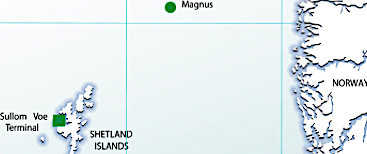North Sea exploration firm EnQuest said it agreed to acquire from BP an initial 25% interest in the Magnus oil field for about $85 million — with an option to acquire the remaining 75%.
The deal also includes the acquisition of a 3% interest in the Sullom Voe oil terminal (SVT), 9% of the Northern Leg Gas Pipeline (NLGP) and 3.8% of the Ninian Pipeline System (NPS).
EnQuest already has 3% of SVT, 5.9% of NLGP and 2.7% of NPS.
EnQuest will become the operator of the transaction assets, with the transition expected to take between six and 12 months.
The $85 million price will be funded by deferred consideration payable from the cash flow of the transaction assets.
“This transaction reflects confidence in EnQuest’s ability to maximise value from late life assets with significant remaining resource potential,” said EnQuest in a statement.
“EnQuest believes the innovative transaction net cash flow sharing structure can also become a template for transferring maturing assets from other majors to efficient operators such as EnQuest.”
EnQuest said it has an option to acquire from BP the remaining 75% in Magnus, an additional 9.1% interest in SVT, 27% in NLGP and 11.5% in NPS between July 1, 2018 and January 15, 2019, for a base consideration of $300 million.
“This consideration will be payable in $100 million of cash by EnQuest, with the remainder funded as non-recourse loan by BP which will be serviced and repaid through cash flow from the transaction assets,” said EnQuest.
“BP will also retain a 50% net cashflow share, and will benefit from future investments with respect to the 75% interest, once the consideration (including interest and adjustments) has been recovered from net cash flow from the assets.
“BP’s share is capped at $1 billon with all additional amounts to the benefit of EnQuest.”
EnQuest CEO Amjad Bseisu said: “This transaction capitalises on EnQuest’s strengths in realising value from the management of maturing oil fields, as underlined by BP’s confidence in proposing a change of operatorship to EnQuest.
“Magnus is a good quality reservoir; it has large volumes in place, with potential for infill drilling and for the revitalisation of wells, and scope for field life extension.
“It is a producing asset that would materially increase EnQuest’s reserve base. We are a natural strategic partner to BP for maturing assets and this innovative structure represents a natural evolution of EnQuest’s business.”
Bernard Looney, BP chief executive, Upstream said: “As BP continues to focus its North Sea portfolio around assets where we can add new capacity through disciplined investment in major projects, it is essential to partner with experienced operators like EnQuest to extend the life of existing mature assets like Magnus and Sullom Voe for the benefit of both companies and the region as a whole.”
Mark Thomas, BP North Sea Regional President said: “With their integrated skills, operational scale, cost structures and high levels of operating efficiency we have seen what EnQuest can do on the Thistle, Deveron and Don fields that were previously operated by BP.
“We believe this is a good example of having the ‘right assets’ in the ‘right hands’, offering new opportunities for the assets and benefitting the UKCS, in the spirit of Maximising Economic Recovery.”
EnQuest also has the option as part of the agreement to receive $50 million from BP in exchange for undertaking the management of the physical decommissioning activities for the Thistle and Deveron fields.
Oil & Gas UK chief executive Deirdre Michie said: “This is an innovative deal which will open a new chapter in the life of Sullom Voe and the productive life of Magnus, an iconic North Sea oil field.
“It also sends a very positive signal on the opportunities available in the North Sea and is an indication of confidence that, even after producing oil for more than thirty years, this mature field still has more to give.
“The transfer of assets and infrastructure builds on a long-term trend to see ‘the right mature assets’ move into the right hands of established UK mature field operators and sees a fresh commitment to exciting development opportunities by established incumbent companies.”
Meanwhile, in a trading update, EnQuest said its 2016 production averaged 39,751 Boepd (barrels of oil equivalent per day) in 2016, up 8.7% on 2015, with production in the UK North Sea up 11.3%.
This was EnQuest’s highest annual production since the company started in 2010.
“Final production was adversely affected by the shutdown period at the end of the year, where the maintenance shutdown of the Brent Pipeline System took over a week longer than was anticipated, with winter weather also hampering the work necessary to bring production fully back onstream,” said EnQuest.
EnQuest’s net debt as at December 31, 2016, was expected to be $1.8 billion.
